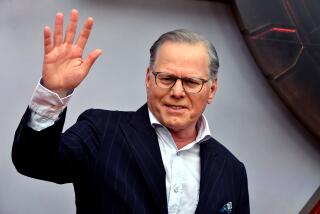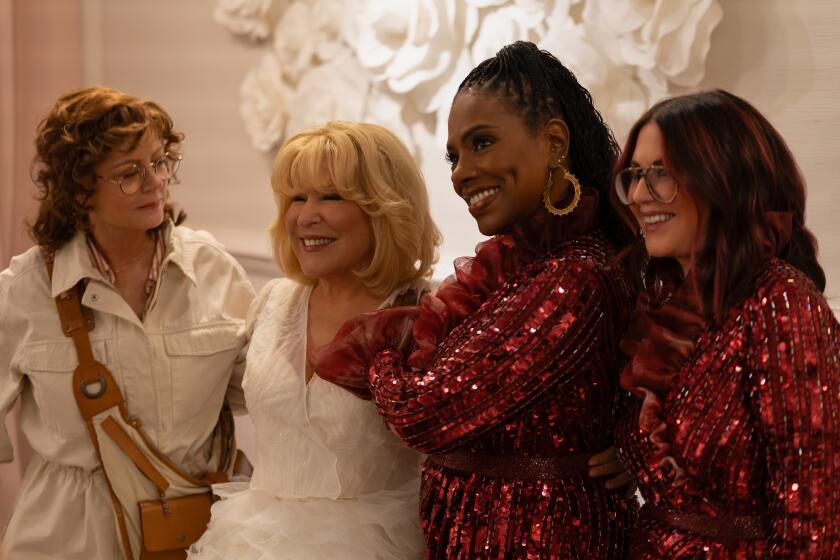Sony Says It Will Take Action Over Fake Critic
Sony Pictures Entertainment vowed Monday to conduct a full internal inquiry to uncover who at the studio’s advertising department created a fictitious film critic for a weekly newspaper in Connecticut that gave glowing quotes about such recent Sony films as “The Animal” and “A Knight’s Tale” in newspaper advertisements.
The humbling admission by one of Hollywood’s major studios, which releases films under the legendary Columbia Pictures label, not only drew strong rebuke from the heads of two major film critics associations, but also shed light on the proliferation of obscure reviewers who studios often turn to when hyping their films.
“It’s embarrassing and it’s wrong and we will take appropriate action,” said a spokeswoman for Sony, who said the investigation is focusing only on the studio’s advertising department and not its publicity department. So far, there is no indication that the improprieties reached into the upper chain of command at the studio.
The current scandal came to light in this week’s issue of Newsweek magazine, which disclosed that “David Manning” of the Ridgefield Press in Ridgefield, Conn., “is a fake, a product of the studio’s advertising department.” The magazine found that the nonexistent reviewer praised actor Heath Ledger of “A Knight’s Tale” as “this year’s hottest new star!” and saluted “The Animal” as “another winner!” The fake reviewer also raved about two other Sony movies that debuted last year--”Hollow Man” and “Vertical Limit.”
An unidentified Sony employee, Newsweek said, may have concocted the Manning persona, using the name of a friend. The Manning quotes have been taken out of current ads for “The Animal” and “A Knight’s Tale.”
Tom Sherak, a partner at Revolution Studios--producer Joe Roth’s production company, which made “The Animal”--said Monday, “Our take is that they [Sony] need to figure out what happened and straighten it out. . . . It’s one of those things that’s a taboo. There’s a lot of spin going on in our business, but this is something you never do. I think they [Sony] approached it correctly. Mistakes were made and now they are going to investigate it.”
Bona fide critics are upset by the hoax--though not surprised given how studios orchestrate blurb quotes.
“I think it is outrageous,” said Joey Berlin, president of the Broadcast Film Critics Assn. “It’s not a huge surprise. Personally, from our perspective, we feel kind of vindicated in a way. If film critics were so compliant, then maybe they wouldn’t have to resort to this to get their quotes.”
Peter Rainer, who heads the National Film Critics Assn., said this is the end-product of an industry that cultivate junketeers--critics and reporters from small, obscure publications, broadcast outlets or dot-coms--who, in exchange for a free trip and meals, are pretty much guaranteed to write positive reviews about the films they are shown.
“It’s been demonstrated in the past that studios will, in effect, create the kind of reviews they want by cultivating junketeers, who then provide quotes for the ads,” Rainer said. “Studios are in the business of getting good press now and if critics are perceived as not being part of ‘the team,’ they are marginalized. There are cadres of blurbmeisters who will do their bidding. This is the logical extension of that. They have taken out an added insurance policy by creating their own critic. Where they slipped up was not creating their own newspaper.”
Newsweek senior writer John Horn said that when he set out to write the story, he did not harbor suspicions that Sony had invented a film critic. Instead, he said, he was merely doing a story about the proliferation of junket ads--those blurbs from often-obscure critics that adorn movie ads. Horn said he believes such ads are “undermining the integrity and value of real critics.”
“I felt the studios were taking a very shortsighted approach to dealing with the audience by showcasing quotes from obscure critics,” Horn said Monday.
As an example, Horn said he looked at the ad that ran a week ago Sunday in The Times for “The Animal,” which contained a number of favorable quotes, even though the studio had not screened the Rob Schneider comedy for mainstream critics. After calling around various other studios to find out what he could about the obscure reviewers and their publications, everyone checked out except David Manning.
“Two people [at other studios] said they hadn’t heard of him,” Horn recalled. He then checked the Internet and Manning “just didn’t turn up.” Then he called the Ridgefield Press and was told Manning didn’t work there.
Jack Sanders, executive editor of the 7,500-circulation weekly paper, located in an affluent suburban community of 23,000 residents about 50 miles northeast of New York City, said Monday that the issue was brought to their attention a couple of months ago but the paper took no action because it thought Manning’s name was coming from a movie listing service that the paper uses.
“Why [Sony] used the Ridgefield Press as opposed to the thousands of other papers this service goes out to, I don’t know,” Sanders said. “We thought it was somebody local making up the ads or some clipping service, but we never connected it with a bunch of lousy movies.”
Sanders, who has worked at the family-owned chain of seven papers for 32 years, said the Ridgefield Press does have its own reviewers.
“We actually have a pair of reviewers--a father and son,” he said. “The son is a teenager and the father is in his 40s, I think. Both review the same movie together and write the same reviews.”
Sanders said the Sony scandal has resulted in his paper receiving “angry e-mails suggesting that we were somehow involved in this.”
Sanders called the fictitious film critic “unethical.”
“We are all sort of amazed that this company [Sony] has not even called to apologize,” Sanders said.
More to Read
The biggest entertainment stories
Get our big stories about Hollywood, film, television, music, arts, culture and more right in your inbox as soon as they publish.
You may occasionally receive promotional content from the Los Angeles Times.






